Best Real Estate CRM Software
Best real estate CRM software in 2023 includes Wise Agent, AgileCRM, RSquare, DaeBuild, LeadSquared, and Zoho. These tools help you to create the most effective strategies and cater to the needs of real estate agents and companies.



Connect With Your Personal Advisor
List of 20 Best Real Estate CRM Software
Zoho is an all-in-one real estate CRM software for all sizes of real estate agencies. Zoho CRM caters to multiple requirements of real estate agents and helps them handle end-to-end process management efficiently. Take the lead and close more deals by implementing Zoho in your business. Read Zoho CRM Reviews
Starting Price: Starting Price: $10 User/Month
Recent Review
"Great software to track user information" - Rajan Panchal
EngageBay is a simple, powerful, all-in-one marketing, sales and service automation software with free CRM for startups and growing businesses. EngageBay helps you automate your marketing, sales and support by combining lead generation, email marketing, marketing automation, CRM & social media engagement, helpdesk, and ticketing. Read EngageBay Reviews
Starting Price: Available on Request
Recent Review
"Its okay to use" - Vishal singh
A project management software you'll enjoy using
monday.com Work OS is the no-code project management platform that lets you easily plan, manage, and track projects, collaborate in real-time, and use automations and integrations to streamline workflows and save time. Read monday.com Reviews
Starting Price: Available on Request
Recent Review
"I love this software for planning marketing departments" - Laura Fernandez
NetHunt is a sales-focused CRM software for real estate agents and agencies. It organizes a contact database, manages sales pipelines, automates tasks, and furnishes sales and client details whenever you need them. NetHunt is a great CRM in real estate as it saves you a lot of time by automating routine tasks. Read NetHunt CRM Reviews
Starting Price: Starting Price: $30 User/Month
Recent Review
"Best CRM Integration I Have Ever Used" - Syed Farham
Buildium is a simplified and unified property management software. It balances automation, ease of use, and business growth by offering features that make business operations, leasing, marketing, accounting, and payments easier. With Buildium, you can manage everything from a single space and make the right decisions with its powerful analytics and actionable insights. Read Buildium Reviews
Starting Price: Starting Price: $45 Per Month
Recent Review
"This software is very easy to use" - Inthias
Realeflow is one of the best CRM for real estate investing businesses. It organizes and manages buyers, sellers, and all other contacts by building targeted sales lists and assigning deal stages to each property. Realeflow documents everything you and your team need centrally, allowing you to collaborate whenever you want. Learn more about Realeflow
Starting Price: Starting Price: $175 Per Month
Keap CRM is a fully featured Sales Automation software designed to serve SMEs, Startup, Agencies, Enterprises. Keap CRM provides end-to-end solutions designed for Web App. This Sales Automation software offers Acquiring new leads, Email marketing, Client management (CRM) at one place. Read Keap CRM Reviews
Starting Price: Available on Request
Recent Review
"Great value for many services in one" - Mindy Iannelli
Category Champions | 2023
NetSuite, #1 cloud ERP, is an all-in-one cloud business management solution that helps more than 29,000 organizations operate more effectively by automating core processes and providing real-time visibility into operational and financial performance. Read Oracle NetSuite Reviews
Starting Price: Available on Request
Recent Review
"Great ERP solution for businesses of all sizes" - Parshwa Bhavsar
| Pros | Cons |
|---|---|
|
user friendly powerful |
none |
High Performer | 2023
By using high-end real estate CRM software, Freshworks CRM, you can build a 3-tier payment reminder process. This best CRM system for real estate can also be used to automate the lead generation process at every level. Read Freshsales Reviews
Starting Price: Starting Price: $13.88 User/Month
Recent Review
"Review of Freshsales" - sher afgan
| Pros | Cons |
|---|---|
|
Very smooth and quick |
Little bit slow |
|
Features |
Interface can be more better |
Category Champions | 2023
Hubspot is India's best CRM software for real estate. It lets you view your entire sales pipeline in real time and equips you with detailed reports on sales activity, productivity, and individual performance. Spot team growth opportunities, track team performance, and grow your business by connecting your marketing, sales, customer service, content management, and operations with Hubspot CRM. Read Hubspot CRM Reviews
Starting Price: Starting Price: $45 Per Month
Recent Review
"HubSpot CRM review" - Val R
| Pros | Cons |
|---|---|
|
Easy navigation, Transparency, No hassels in data addition. Remarks added by anyone can be viewed by anybody in a sales heirarchy |
Faced only once con - lead source details had to be entered twice to register, despite adding the same at initial level |
|
Automation and integration made easy |
need to fasten their customer response |
Category Champions | 2023
DaeBuild is a comprehensive CRM software system for builders and real estate agents. DaeBuild makes managing leads, sales, customers, staff, and brokers simple, so you will never miss a follow-up, allowing you to put more effort into building strong connections with your clients. Read DaeBuild Reviews
Starting Price: Available on Request
Recent Review
"Quality and service very good" - suresh kumar gour
| Pros | Cons |
|---|---|
|
It's service are very important,and support are very best |
Not any all is good |
|
Advance, featuring, user friendly |
It's user friendly. easy to run this app and also it gives perfect accuracy. |
Contenders | 2023
Salesmate is a real estate CRM software that helps sell more properties by eliminating guesswork and introducing automated processes. It offers lead management, personalized follow-ups, sales pipeline tracking, built-in communication, and many more productivity-boosting features. Automate your entire sales process and say goodbye to repetitive manual tasks with Salesmate CRM. Read Salesmate CRM Reviews
Starting Price: Starting Price: $15 User/Month/Billed Annually
Recent Review
"Good" - MuhammadSahil Jora
| Pros | Cons |
|---|---|
|
Easy to use. |
Nothing. |
|
User-friendly |
No recharge/wallet method |
Salesforce is the best CRM software for real estate agents. Salesforce is developed to drive business growth while cutting expenses. This integrated CRM platform connects every aspect of your business, including sales, marketing, and service one integrated platform to help you build a client portfolio that consistently has success stories to share. Read Salesforce Reviews
Starting Price: Starting Price: $25 User/Month
Recent Review
"Best CRM Management Tool For Enterprises" - Sabish Chaurasia
| Pros | Cons |
|---|---|
|
The Salesforce CRM solution is available only for software-as-a-service (SaaS) deployment. In addition, this Salesforce app provides a technology stack that covers database and security as well as workflow and user interfaces. |
Nothing as such. It is just a very helpful and productive tool for us |
|
We can easily track project status, customer interaction status. We can produce customizable reports and dashboards. |
Sometimes it gives error and poor customer service experience. |
Bitrix24 is one of the best CRM software which provides a platform to organize and track interaction with potential or existing clients, partners, agents and other contacts. It is a collaboration platform that's perfect for CRM. It has over 30 tools that will help your business grow and enjoy the work in a team. Read Bitrix24 Reviews
Starting Price: Starting Price: Available on Request
Recent Review
"TOP 1 CRM Software- Bitrix 24" - evez
| Pros | Cons |
|---|---|
|
The most impressive features of Bitrix 24 are tasks, workgroups and, most importantly, the CRM system. The program is easy to use on computers. This program gives a positive direction to any company. |
A missing feature in Bitrix 24 is the employee tracking section. Business owners need tracking programs to increase their trust in their employees. If the tracking function is added to this program, it will become the number one program in the CRM sector |
|
Its long lasting Feature list |
User Interface is quite complicated |
Emergents | 2023
RSquare is an integrated customer relationship management software for real estate professionals. It drives sales growth by managing and organizing exhaustive details of customers and leads and generating quotes, invoices, receipts, and reminders. With RSquare CRM, you will always win customers by offering professional customer communication and real-time responses. Read RSquare Reviews
Starting Price: Available on Request
| Pros | Cons |
|---|---|
|
It was disgusting |
Whole Team |
|
Free to use |
Easy to use hassel free |
Emergents | 2023
Upscale your business with the best-in-class CRM for real estate developers. Bhoomi CRM software is an all-in-one customer relationship management platform for pre-sales, post-sales, and financial management in a real estate business. Bhoomi is an excellent tool for day-to-day task management as it provides a complete view of the business, provides system-driven management for making better decisions, and eliminates inefficiencies in the workflow. Read Bhoomi Reviews
Starting Price: Starting Price: $16.67 User/Month
| Pros | Cons |
|---|---|
|
Platform flow is the best. |
Integration |
Category Champions | 2023
Cloud and Mobile Real Estate CRM Software
Cratio is a sales CRM software designed for builders, developers, and real estate agencies. Cratio autopilots your business by automating sales processes and customer engagement. It offers everything you need to sell faster by accelerating sales and measuring and boosting your sales team's performance. Read Cratio Real Estate CRM Reviews
Starting Price: Starting Price: $5.54 User/Month/Billed Quarterly
Emergents | 2023
Wise Agent is one of the most simple and affordable CRM for real estate agents. It offers seamless end-to-end transaction management and provides instant access to your client information by centralizing all the data. This easy-to-use, fully automated marketing software equips you with everything you need to build a successful real estate firm. Read Wise Agent Reviews
Starting Price: Available on Request
Recent Review
"Brilliantly designed Customer Relationship Management system." - Pravesh Barot
| Pros | Cons |
|---|---|
|
I personally like the feature of unlimited Document Storage in Wise Agent software. There is no loss of data. |
It is a robust tool which is designed with perfection. Didn’t find any cons. |
|
Wise Agent is not just a software. With all the embedded features it works just like another team member. It has automated Lead Management, Tracking and CRM for us. We paid one time but have been saving a lot of time, energy and money after that. Our emai |
A little pricey. |
Transform your real estate business with Fieldproxy's all-in-one automation solution. Fieldproxy helps builders and contractors build better service technician teams by simplifying tasks like on-site order taking, automated service scheduling, route optimization, and payment collection. Learn more about Fieldproxy
Starting Price: Starting Price: $10 Per Month
Category Champions | 2023
LeadSquared is a smart real estate CRM software that helps builders, brokers, and agents get more done in less time. It introduces a new, automated way of running digital sales, marketing, operations, and customer care center more efficiently. It helps increase property sales, project marketing campaigns, and manage and engage with property buyers and leads until they become clients. Read LeadSquared - CRM Reviews
Starting Price: Starting Price: $17.36 User/Month/Billed Annually
| Pros | Cons |
|---|---|
|
Implementation Partner, Workflow & UI |
Sales Team's Unprofessionalism, Lying to customers, Going back from what they promised to us on paper. |
|
Its advanced search filter options |
Fetching any report on leadsquared can be improved. |
Until 31st Mar 2023

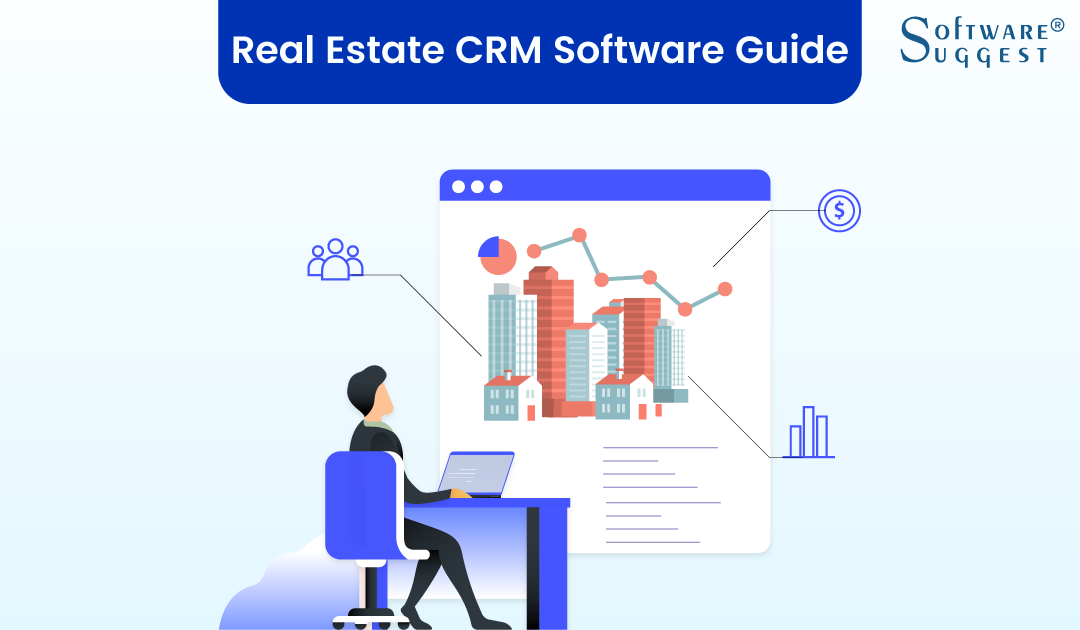
What is Real Estate CRM Software?
Real estate CRM software provides a single platform to manage all quintessential tasks of real estate business operations, which helps real estate agents to work efficiently and increase productivity. Think of managing all the routine tasks such as running between meetings, emails, payments, and other dozens of jobs, which may lead to wastage of time. The best real estate CRM software is a savior for the implementation of effective task management as it automatically collects data and helps to manage client relationships. It helps facilitate the sales funnel right from finding the potential client to handing over the property keys to the customer.
Types of Real Estate CRM software
Real estate CRM software is one of the main types of real estate software, along with real estate management systems. The CRM component in the software helps you streamline marketing and maintain strong relationships with your customers.
Real estate CRM software is categorized into two types:
1. On-Premise Real Estate CRM
On-premise solutions reside on your systems. These solutions come with one-time end-user licenses. With this type of real estate software, you're responsible for the maintenance and management of your database and server security.
Therefore, you can manage all the changes and upgrades you want to make in the system. For that reason, on-premise solutions are slightly expensive and can be tedious to implement.
On the positive side, these systems offer enhanced privacy and security. Since on-premise software resides on your system, you'll be in charge of the uptime and user authorization.
2. Cloud-Based Real Estate CRM
Unlike on-premise systems, cloud-based solutions reside in the cloud. They work on a monthly subscription model instead of a one-time end-user license.
Since they're not installed on your device, they don't require manual installation. You can subscribe to a plan and start using the software without going through any cumbersome setup process.
On the downside, cloud-based solutions are at risk of data theft and cyberattacks. You'll have to rely on your cloud provider for uptime and security.
Cloud-based vs. On-premises Real Estate System: Which one is better?
Let's take a look at each category individually, along with their advantages and disadvantages.
1. Cloud-based real estate CRM
A cloud-based CRM is a CRM system that can be used via the internet. The program is installed on a third-party server, and you can access its services by paying a monthly subscription fee.
Advantages
-
You don't need to incur any hardware and installation costs as everything is set up by the vendor
-
There's no need to worry about additional costs, such as maintenance or update, as it is taken care of by the vendor
-
All the upgrades, technological glitches, and bug fixes are handled externally by the service provider
-
Cloud-based solutions enable you to create mobile CRMs, thereby providing your team members with enhanced mobility
-
With all the data being stored in the cloud, you and your team members have easy access to it anywhere, anytime
-
Cloud-based solutions are easily customizable to provide your team members and customers with the best experience
Disadvantages
-
You don't have complete control of your real estate CRM systems and data
-
You may face downtimes when the server is under maintenance or upgrading
-
You have to reach out to the vendor for even the smallest issues
2. On-premise real estate CRM
You can also build the best CRM software for real estate agents specific to your company and usage. If you don't want a third-party vendor to handle your data, implementing an on-premise real estate CRM can be an option.
Advantages
-
You have complete control of your real estate CRM systems and data, including downtimes, upgrades, customizations, etc.
-
Your data is hosted on your local servers, which reduces the risk of data theft
-
Real estate companies with a large number of users can save money as they can develop a system for as many users without incurring any extra costs
Disadvantages
-
There's a lack of mobility; developing a mobile app can be challenging, and users cannot access data from anywhere
-
Deployment and upgrading can be costly
-
On-premise solutions require substantial upfront and maintenance costs, which can be expensive for small and medium-sized businesses
Top Features to Look for in Real Estate CRM Software
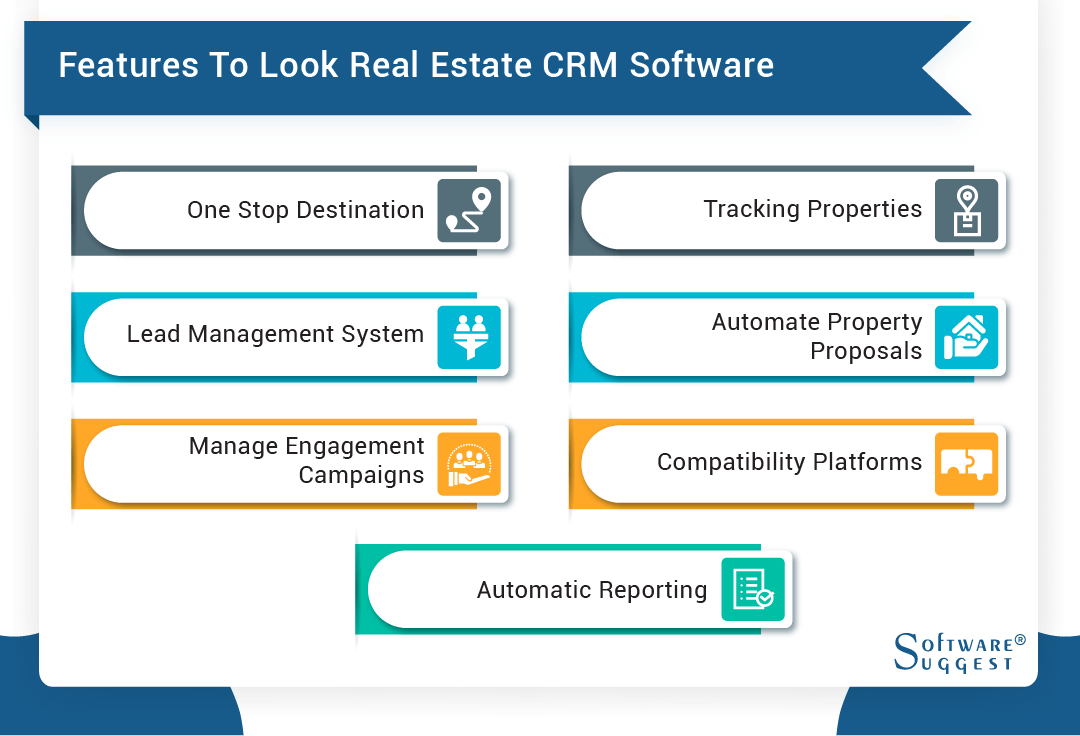
1. One-stop destination
Real estate CRM software is an indispensable tool for brokers, real estate agents, and marketplaces. It is easy to use and helps you to stay organized as all the data related to tracking properties, interaction with prospects, leads, etc., are accessible and manageable in one place. Cloud-based real estate CRM systems offer mobility to realtors in terms of better communication with clients.
2. Lead/Contact Management System
Managing multiple contacts at once is a difficult task as sources for these are generally found in listings and referrals. Therefore, losing out on any of the contacts due to ill communication or ineffective management can take a toll on potential revenue. A lead management real estate CRM software provides a robust structure for qualified lead and contact management.
Top real estate software systems offer a feature to segment or group prospects based on various parameters such as preferences, demographics, financial status, and many more. This helps in keeping track of personalized communication and strategizing selling methods.
3. Manage Engagement Campaigns
With the help of the best real estate CRM software, a realtor can automate communication with prospects and leads via email drip marketing campaigns or social media channels. An effective communication action plan ensures nurturing the prospects to increase the chances of conversion, for instance, segmenting the communication pieces based on what stage of buying a prospect is going through.
For example, if a candidate is at the exploring stage, then relevant content should be shown like discounts on home loans or property to keep him engaged with the help of real estate client management software. Engagement campaigns can also be tracked to analyze which of them performed better and provided a better return on insurance.
4. Tracking Properties
Prospective buyers generally start with searching properties online and discovering the best-suited properties that they might be interested in viewing. With a good real estate CRM tool, a realtor doesn't need to visit all websites to stay current; instead, the real estate CRM software integrates the information into one single platform to help stay updated. It helps to maximize the time spent on convincing the prospect and closing the deals, preferably on finding updated data.
5. Automate Property Proposals
Real estate CRM systems help automate formatted and well-structured property proposals. It fast-tracks the process of creating a huge number of property proposals without errors. It also tracks all the proposals sent.
6. Compatibility with Popular Platforms
Every business utilizes products like Google Suite, and spreadsheets even in the real estate business. A top real estate CRM software is compatible with all these popular tools which don't require real estate agents to learn other unfamiliar and sophisticated software.
7. Automatic Reporting
One of the best features of real estate CRM systems is that it helps drive accurate insights via automated reporting. Reporting empowers the strategic decisions in a real estate business by looking at different essential metrics such as sales funnel, marketing funnel, etc. With the help of automatic reporting and effective performance management, optimization measures can be implemented.
Benefits of Using Real Estate CRM System
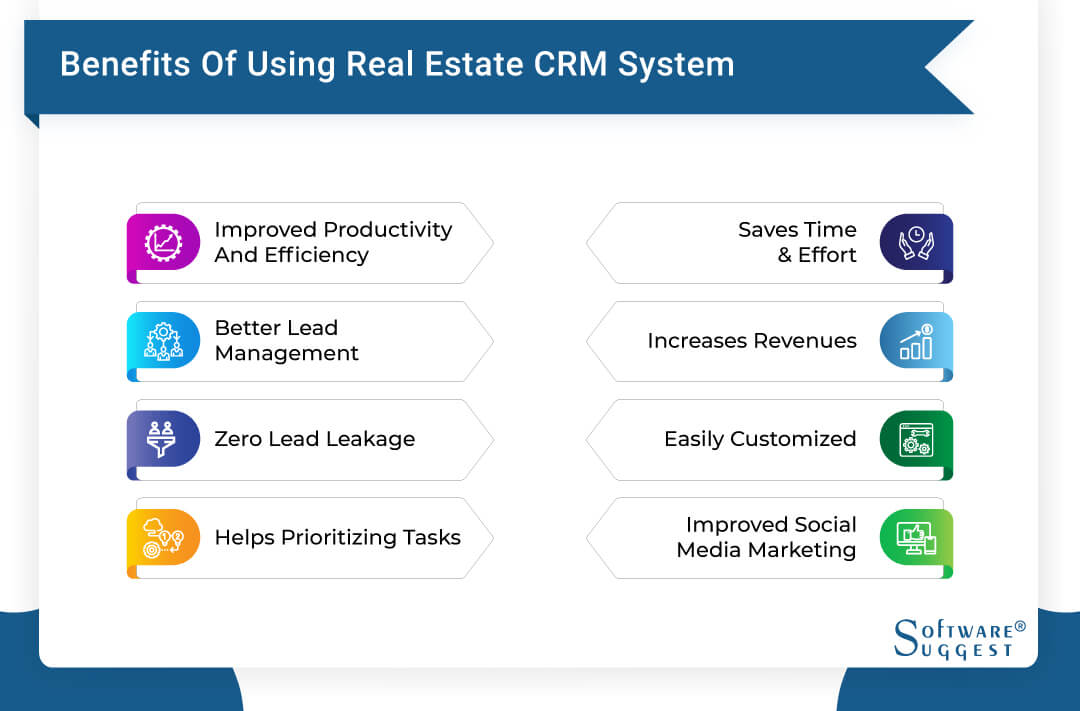
If you carefully plan, integrate it meticulously, and use it properly, you can find numerous benefits in using a real estate CRM system. Here are some of the benefits:
1. Improved employee productivity and efficiency
With effective task management, the best CRM system for real estate helps to integrate all the processes on one central platform. It minimizes time spent on ordinary daily tasks and increases productivity. With automatic reporting, one can do an in-depth analysis of performance funnels and optimize accordingly.
2. Better lead nurturing and management
Real estate CRM tools help in managing listings and inquiries. Segmentation of prospective buyers based on various factors helps improve relationship management.
3. Zero lead leakage
Getting leads from all the channels is a difficult task. Each lead can be a future client. Hence, real estate CRM software ensures that there is no lead leakage by capturing all the inquiries from websites, marketing campaigns, and other marketplaces. It also helps in managing communication across all the channels and determining which campaign is performing better.
4. Helps in prioritizing employee's tasks
Certain real estate CRM software provides a lead score and activity score based on prospect behavior and profile. This helps in finding low-quality requests and high-quality requests. The software automatically prioritizes them with a combination of these scores.
5. Saves Time & Effort
The real estate CRM software gathers and stores all the customer interaction databases in a centralized manner, which ends up saving time in data management. Team members can then see any relevant data easily of a lead and work faster on converting it into a sale. Thus, it speeds up employees' way of organizing data. Also, the system can assign targets to each employee to work on if you set for automatic delegation, thus making the software more transparent. It helps reduce the efforts of the top management to focus their time instead on planning and executing other business operations.
6. Increases Revenues
Management teams will be able to know the customer better and thus formulate data-driven policies and maximize revenue through it. They will be able to build a proper framework to meet the sales targets through optimal operational efficiencies.
7. Easily Customized and Scaled
Most real estate CRM software is developed in a way to help you scale it up along with your organization. You can start off using the real estate CRM software with some need-to-have and basic functionalities and then opt for more advanced solutions with the growth of business operations.
8. Improved Social Media Marketing
To maximize customer engagement, reaching out to prospective clients through social media accounts has the best advantages to cost. Most real estate CRM software these days offers integration of social media channels such as Twitter, Facebook, Instagram, etc. This allows the realtors to monitor the customer segment, their behavior, and engagement, and get real-time feedback.
How to Select the Right Real Estate CRM Software?
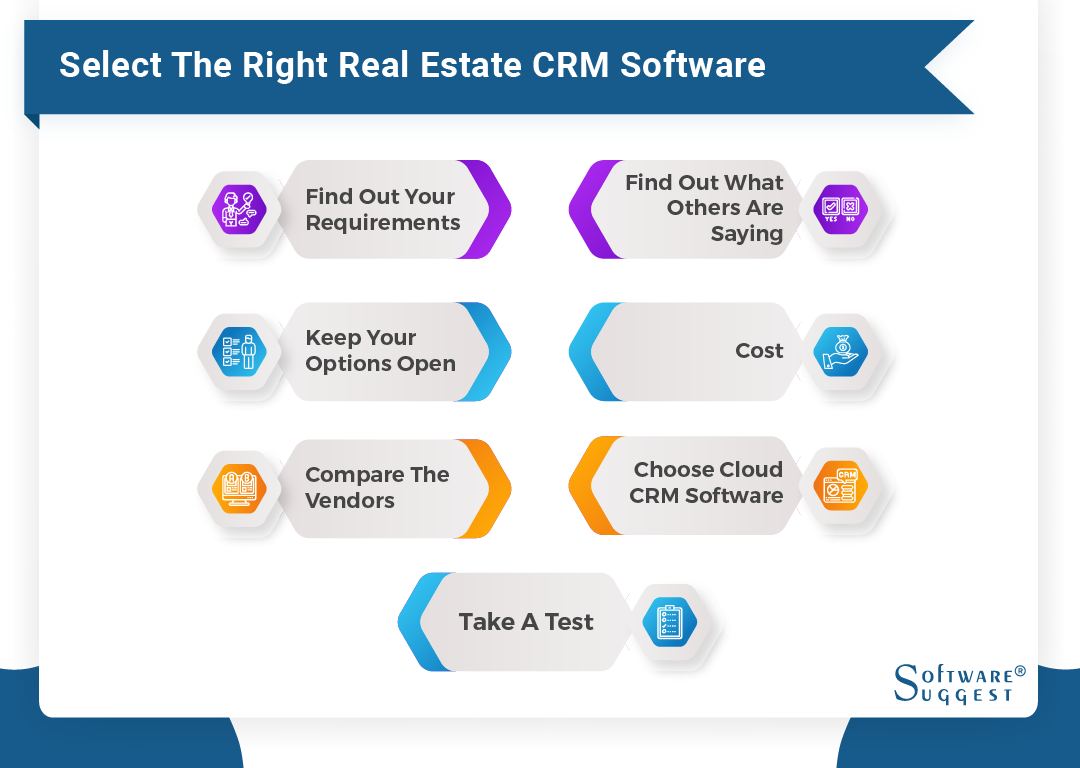
Selecting the right real estate CRM software is a daunting task as there are numerous real estate CRM solutions available in the market today with different features. But real estate CRM software isn't a universal fit for all. Every agency works differently, and thus, one should evaluate all the options carefully before opting for the right real estate CRM software.
Here are some of the factors upon which one should evaluate the alternatives for selecting the right real estate CRM software solution:
1. Determine the goals
The most crucial step is to determine the needs and requirements of the agency. Every real estate software tool has its own strengths and weaknesses. Thus, one should clearly lay down what features are crucial to not go overboard in the name of advanced features attached to different real estate CRM software. You can find out detailed proposals from vendors if you ask them for the exact requirements that you need.
2. Levels of automation
It is essential to determine the level of automation one is looking forward to from this software. For example, complete automation of the processes of the sales funnels or just a lead management real estate CRM solution.
3. Keep your options open
You might be thinking of real estate CRM software to be a niche market that will have only three or four primary vendors. But frankly, there are hundreds of vendors giving you real estate CRM solutions with varying degrees of functionality. Many organizations have an unreal knack for options for vendors that are well-branded. Instead, choose from the providers that are going to meet your needs the best.
4. Compare the Vendors
Comparing two products from two different vendors is something you usually do before purchasing anything, right? Well, you need to do the same to find the best CRM software for real estate agents too. Comparing vendors will not only save you money but also you'll get to come across reliable providers faster. Select those providers that have a good reputation for giving customer service. It only makes sense to partner up with such a vendor that offers stability in support and upgrades in the solution for your business in the future.
5. Find out what others are saying
Get a suggestion or an opinion from colleagues, subordinates, friends, and other contacts who have a business similar to your company. Contact people through Google reviews. You can even hire a CRM expert to help you guide better and faster. In any case, you shouldn't assume to be a know-it-all from a little homework done on any software before having experienced it first-hand. Search for independent sources who are using it or experts in real estate CRM to help you confirm whether whatever information you get about the software utility is either valid or not.
6. Find out the total cost of ownership of the CRM
You should be able to get a clear picture of the total cost of ownership or at least a ballpark of your real estate CRM purchase. Software providers tend to keep hidden after-app purchases in CRM apps of real estate to confuse and deceive you. These after-purchase costs include hardware, installation charges, internal or external project resources, customization, maintenance, updates, etc. Whether you want a solution based on a turnkey principle or a personalized system, it should be able to tell you the exact total cost of ownership. Turnkey real estate CRM software solutions generate less price in initial deployment, while customized solutions will keep burning a hole in your pocket.
7. Choose Cloud CRM software
Cloud computing is prevalent, which gives us no wonder why so many companies are looking for cloud-based real estate software. Over the past few years, there has been a rise in the adoption of cloud-based CRMs in the real estate market. Today, almost all real estate CRM vendors in the USA offer cloud-based computing, but make sure to avoid software that is described as an on-premise system.
8. Take a demo
Ask for a free trial period before buying new real estate software. Most of the vendors offer a free trial wherein you can experiment with your hands on the features, functions, and benefits of the software. Through a free trial, you'll get a clear picture of how the software will feel if it is embedded in your real estate organization. Besides, you cannot ignore how realtors have to be mobile the whole time. Hence, a CRM system that supports tablets and smartphones would be a wise idea to ask for free testing.
Top Real Estate CRM Software Vendors by Company Size
Long sales cycles, high lead-customer ratio, and almost no-repeat purchases – being a real estate professional can be challenging. A real estate CRM system can help realtors and real estate firms scout new business opportunities and convert leads into customers.
But the type of real estate CRM tool you use will depend on the size and type of your business.
Real Estate CRM Software Comparison for Enterprise
Large real estate businesses, including construction firms and mortgage lenders, need robust CRM capabilities to manage contacts and prioritize tasks.
If you're a real estate firm owner, look for a solution that offers seamless integration with other real estate software, like project management, property and asset management, etc.
Large firms usually deal with sensitive documents and information, so investing in an on-premise solution would be better from a security perspective.
If you want a more flexible, scalable, and cost-effective solution, you can also consider cloud-based alternatives.
The best real estate CRM software for enterprises are:
Real Estate CRM Software Comparison for Medium-Sized Businesses
Medium-sized real estate businesses generally include new construction firms or large real estate investment companies. These parties need CRM capabilities to leverage visualization and data reporting functionality to present business data.
If you're a real estate investment firm, look for a cloud-based real estate CRM that offers robust data consolidation capabilities. It should allow you to create long-term portfolio strategies, along with allowing you to see the total number of deals in the pipeline.
The best real estate CRM software for medium-sized businesses are:
Real Estate CRM Software Comparison for Small Businesses
Real estate agents and small investment firms should use real estate CRM solutions to track their sales pipelines, client correspondence, and contracts.
If you're a real estate agent, you can benefit from the one-place solution a CRM offers. Look for a cloud-based CRM that helps you reduce paperwork and repositories. It should integrate with other systems and help you keep track of your clients and activities.
The best real estate CRM software for small businesses are:
Potential Issues with Real Estate CRM Software
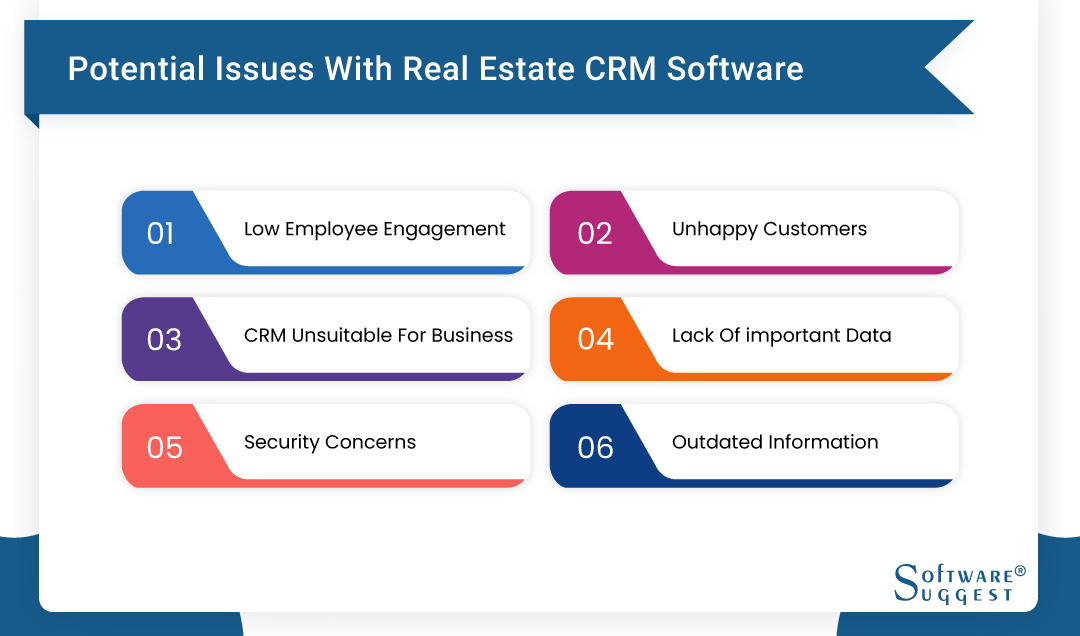
While the best CRM software for real estate agents is useful for connecting better with customers, they might face some potential issues when using real estate CRM software. These problems include:
1. Low employee engagement
This is particularly for real estate companies or firms with several employees and team members. If you have not used a CRM or have been using an old CRM system, getting acquainted with the new software can take time and may temporarily affect the productivity of your business. Therefore, it is essential to provide the necessary training and on-hand experience to all the team members before fully implementing the system.
2. Unhappy customers
Real estate CRM software provides automation capabilities, such as sending daily or weekly listings via email. This may turn out to be a nuisance for some customers. Make sure you strike a perfect balance between personal communication and promotion to ensure your business stays on top and your customers remain happy and engaged.
3. CRM unsuitable for business
When real estate companies hastily implement a CRM system without performing in-depth research, they end up with a CRM package that does not suit their requirements. Every software solution is different, and companies should spend enough time studying different real estate CRM systems and find the one that aligns with their objectives.
4. Lack of important data
Real estate businesses are driven by customer data, and choosing the right kind of data can play a critical role in improving business outcomes. However, most real estate CRM software users tend to collect sales data and personal details, which is not enough to sustain in a competitive environment. You can overcome this hurdle by integrating your CRM with social media channels to track interactions and collect data that will help you better understand your customers.
5. Security concerns
The best CRM software for real estate agents is filled with confidential information, such as property details, customer information, sales data, etc. With such a copious amount of data stored in large databases, data theft and other security threats are always a concern. To ensure security, perform rigorous testing of your CRM package on a regular basis to make sure your data is 100% safe and risk-free.
6. Outdated information
Customer data changes frequently. Their address, phone number, email ID, and buying preferences are never the same and are always subject to change. Regularly auditing your data is important to ensure all the information saved in your system is fresh, relevant, and up-to-date.
Best Tip if You are Confused to Update Your Existing Real Estate CRM Software
If you already have real estate CRM software implemented in your business, then you must be wondering whether to upgrade to the new real estate CRM system just launched in the marketplace with great features.
The answer to this query is simply to determine whether your employees are adaptable to the new real estate lead management software. Take polls on whether the productivity of the employees will increase or will the added features create a menace with the implementation of new CRM software for real estate agents. Remember, sometimes excess is adverse.
After carefully examining all the alternatives and finding the right fit, the next step is to determine the pricing of the real estate CRM software.
In today's world, a smart realtor is one that utilizes technology to thrive in their business and let technology do the heavy weightlifting for them. Real estate CRM software is a boon for businesses as it makes a striking difference in productivity and improving performance.
The bottom line is that incorporating good real estate CRM software can improve all the tasks of the real estate business and make you outshine the rest.
Latest Trends Related to Real Estate CRM Software
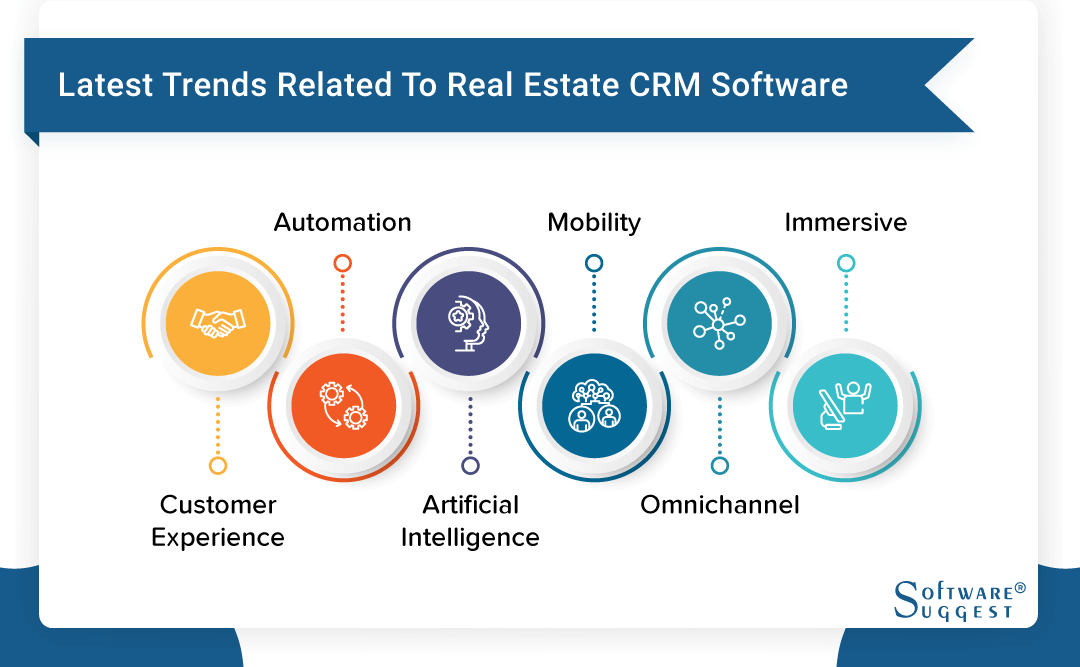
The global real estate management software market was valued at $8.98 billion in 2017 and was expected to reach $12.89 billion by 2025. Real estate CRM platforms are the third-most-popular choice after ERP and project management software.
CRM is one of the new adoptions by the real estate industry, and realtors are readily using real estate CRM software solutions to visualize clients separately and provide them with personalized service and experience. However, with customer needs evolving and technology advancing, we can witness some significant changes in the existing real estate CRM solutions. Here's a look at the latest real estate CRM trends for 2020 and beyond.
1. Customer experience
While improving customer experience has always been one of the sole purposes of CRM systems, the focus is shifting even more towards interaction between the real estate brand and its customers. If you want to stand out from the crowd, you'll need to focus on delivering a superior customer experience, and the best real estate CRM software systems of the future will provide advanced features to help you communicate with a customer.
2. Automation
Realtors need to contact as many prospects as possible in the minimum possible time. The best real estate CRM software tools will offer enhanced functionality to shorten the sales cycle and automate the sales process. Automation helps real estate companies email automate sequences and customer interaction logging, thus, helping them do more in less time and with fewer resources.
3. Artificial Intelligence
AI technology is playing a critical role in several aspects of marketing and sales. The latest real estate CRM software solutions are equipped with powerful AI capabilities for sentiment analysis, improved data integrity, personalized solutions, and more. And as the trend will continue, more and more CRM software applications will be powered by artificial intelligence and machine learning.
4. Mobility
Realtors rely on person-to-person selling. So, sitting in front of the screen in the office all day would certainly not help. Therefore, real estate client management software systems are now offering multi-platform support to ensure you can access the best CRM system for real estate regardless of your location.
5. Omnichannel
Property buyers and investors can be spread across multiple channels. Some might look for properties on Google, some on the "Marketplace" section on Facebook, or some by following realtors on Instagram. Therefore, it is crucial for real estate companies to use an omnichannel marketing approach to provide their customers with an integrated shopping experience. To make this work, the latest real estate CRM software programs are featuring advanced omnichannel capabilities to help you provide a seamless experience across all channels.
6. Immersive
Technologies like Augmented Reality and Virtual Reality play a critical role in engaging real estate customers. Realtors can provide their customers with a virtual tour of the property without actually visiting it. This rise in AR/VR technology has encouraged CRM vendors to update their solutions with AR/VR capabilities to improve sales and customer engagement.
Related Articles:

















 (1).png)



